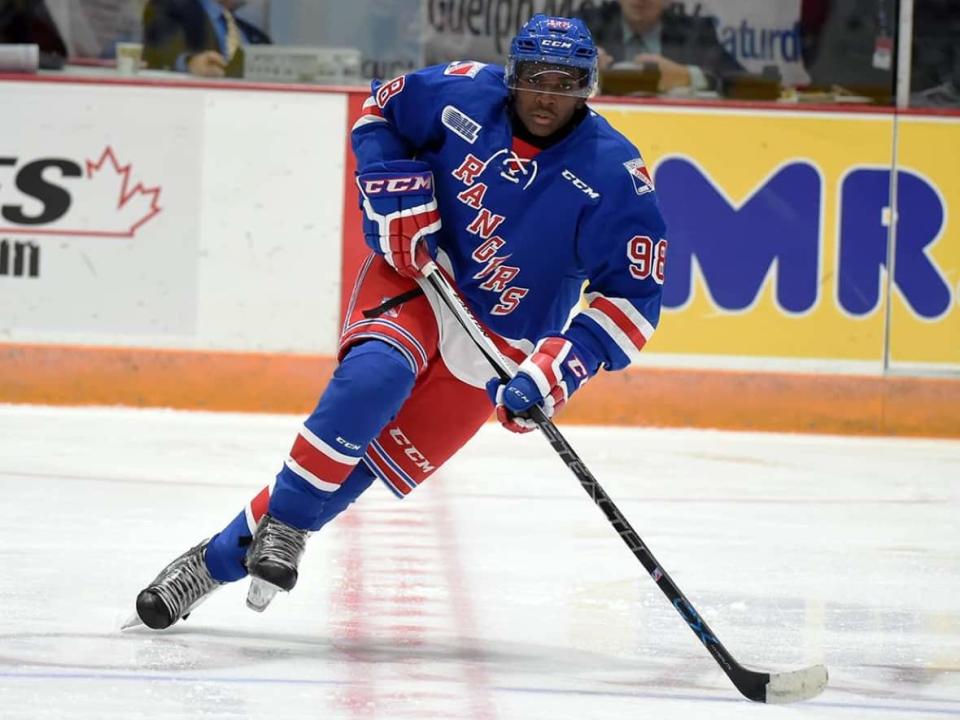OHL says it wants to offer more player training on sexual violence awareness but resources aren't there

The Ontario Hockey League (OHL) says it would like to offer more player education to increase understanding and awareness of sexual violence, but the training personnel from external stakeholders just aren't available, the league's vice-president told CBC News.
However, Ted Baker also didn't offer any solutions to calls for more training as part of the OHL Onside program, which began in 2016.
The hockey culture has been under the microscope after news that a Hockey Canada lawsuit settled earlier this year. It involved a woman complainant who said she had been sexually assaulted by several players on the 2018 world junior team. The case has since been reopened, and the entire Hockey Canada board of directors and chief executive officer recently resigned. Since then, other revelations about the reserve fund have emerged.
The OHL Onside program currently is a two-hour workshop, offered once a year, and examines gender roles, male stereotypes and sexual violence. The program had largely been on hold in 2020 and 2021 because of pandemic restrictions, but is slated to return this fall.
Some organizations that conduct the program on behalf of the league feel two hours of training annually aren't adequate.
The OHL is asked by facilitators to pay a minimum of $300 annually per team for the two-hour workshop. The league has 20 teams: 17 in Ontario, two in Michigan and one in Pennsylvania.
OHL is the largest member league in the Canadian Hockey League (CHL). All three members offer sexual violence awareness programs.
The Western Hockey League (WHL) has its Respect in Hockey Program, which includes "consent educational sessions," a spokesperson said in an emailed statement. The Quebec Major Junior Hockey League (QMJHL) has a number of components as part of its Awareness Program, including "organized" preventive activities.
CBC News had asked the CHL about the frequency of both programs, but didn't hear back by the time of publication.
Violence prevention training 'worth its value'
Baker said that for the OHL, offering more training is difficult due to the "resources which are available" to the outside organizations that facilitate the sessions delivered by the Ontario Coalition of Rape Crisis Centres (OCRCC). Some centres with the OCRCC conduct the OHL workshops for local hockey clubs.
"It's evident in speaking to representatives of the OCRCC that they don't have a lot of man or woman power — person power — within their organizations," Baker said.
"They are lean and mean, they do a great job, but it's not like they have — probably 'human resources' is the best way of saying it — in order to have ongoing presentations, dialogue, etc., etc.," he told CBC.

Nicole Pietsch, an advocate and writer with OCRCC, confirmed that resources are stretched too thin for the sexual assault centres in their network to provide more training across the board, but added that if more funds were made available, additional personnel could be hired.
"Certainly having the resources would make a difference," Pietsch said, suggesting the league could find the money, if it was truly motivated.
"I would imagine that hockey leagues federally and provincially probably pay for lots of other things, right? — whether it's training or certifications, or whether it's equipment, or whether it's their own staff and personnel," Pietsch said.
"And so, that's part of what valuing sexual violence prevention is about is knowing that it's worth its value."
OHL wants to keep Onside program unified: VP
Jacob Pries, who runs the OHL Onside program for the Kitchener Rangers on behalf of the Sexual Assault Support Centre of Waterloo Region, said resources aren't an issue for his organization — if the team wanted more, he could provide them, but currently, that's not happening.
"From our end, we could absolutely run more training," he said. "That literally is what our team is here to do: to train folks in the community. The cost for us to run a training like that with the Kitchener Rangers, in my opinion, is fairly minimal."

He acknowledged this isn't the case for other sexual assault centres across the province.
"We're one of the few communities in the province that have educators that work specifically with men," he said.
His group has been working with other workshop providers in other cities where that's the case, Pries said.
"I was chatting with [the centre in Sudbury] a few weeks ago about supporting their centre to train their local OHL team because they don't currently have a male-identified public education staff. And we know these trainings work a lot better when it's men talking to the men in their room."
Pries said the individual players, and hockey culture as a whole, both lose out by not expanding the workshops beyond the bare minimum.
"This would be like hockey players only having a two-hour training on skating in their lifetime and then expecting them to be able to play hockey at an elite level."
The OHL said it is open to local centres offering more support to teams if they have the personnel, but unless the resources are there, they don't want to commit to formal training across the board for every team.
The league wants to keep the program unified, said Baker.

 Yahoo Sports
Yahoo Sports 
